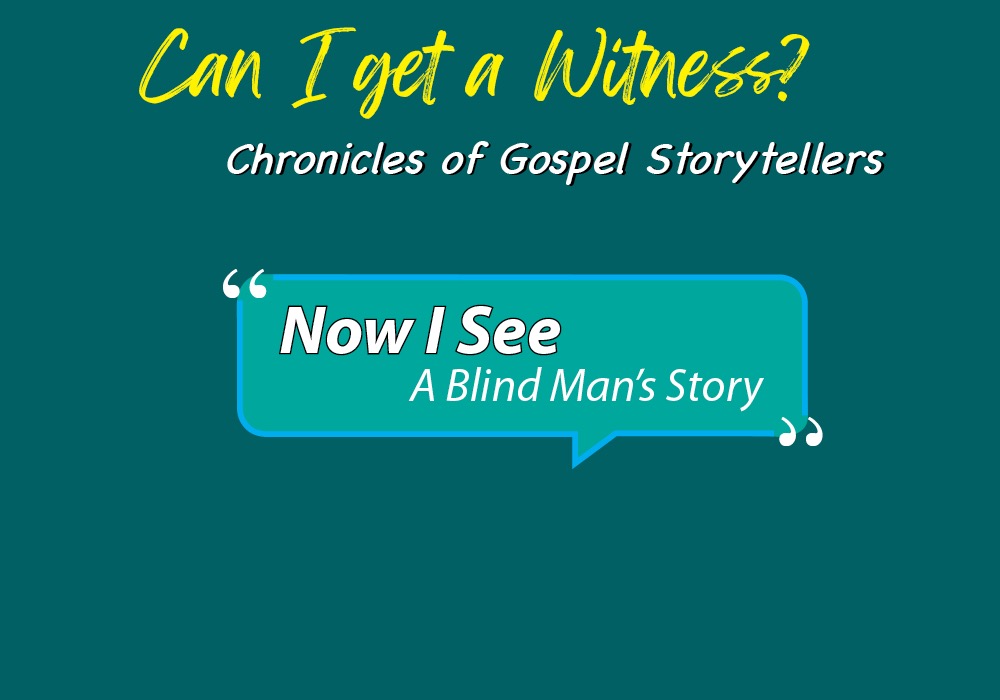To Tell the Truth, a former popular game show, featured three contestants making identical claims about themselves, however only one was telling the truth. The show’s host would then lead celebrity panelists through a series of questions to uncover which of the three contestants was telling the truth.
I share this only as I see a parallel between the premise of this show and the narrative of a man born blind in John chapter 9. Following a unique encounter with Jesus, the man formerly blind receives his sight. Sadly, the townspeople and religious leaders, rather than celebrating this man’s miracle, responded with unbelief and skepticism. Because of this, much like the game show, they question him endlessly to obtain an answer they’re comfortable with. Their twisted attempts, however, eventually backfire disclosing a surprising revelation regarding who is truly blind in this story.
False Assumptions
As the story opens Jesus is walking, and the Scripture records that He sees, meaning He has a perception or an understanding of a man blind from birth. This is actually quite critical, as throughout the narrative numerous individuals seem to think they have some kind of inner sense regarding this man that quite frankly they simply don’t. The disciples are the first to reveal this faulty thinking, as evidenced by their question, “Rabbi, [Jesus]…why was this man born blind? Was it because of his own sins or his parents’ sins?” (John 9:2 NLT).
Rather than address the question, Jesus instead debunks this false assumption by sharing a far greater purpose regarding the man’s blindness. “It was not because of his sins or his parents’ sins…. This happened so the power of God could be seen in him.” (John 9:3 NLT).
More than likely, this was not something the disciples had even considered.
Way Maker, Miracle Worker
Having said this, Jesus then shared the critical importance of “carrying out the assigned tasks by the one who sent [them]” (John 9:4). He then provides a visual by immediately taking action doing the very thing He was sent to do; thereby fulfilling the word of the prophet Isaiah,
The Spirit of the Lord is upon me because he has anointed me to proclaim good news….to proclaim liberty…recovering of sight to the blind, to set at liberty those who are oppressed… (Luke 4:18 ESV, emphasis added)
The disciples heard Jesus’s words regarding the blind man, still they are confused. How could the power of God possibly be seen in him? Although Jesus hears their silent questions, He does not answer with a logical explanation. Instead, He provides them with a miraculous demonstration of God’s power, yet not in a way they would have ever imagined.
Spit, Mud, See
Per His usual, Jesus then does something completely unexpected and somewhat unconventional. What the disciples, the blind man, the townspeople, and the religious leaders all do not understand is this: Jesus is God. He’s not simply like God, rather He is, in fact, God. And God works in ways we often do not understand. His ways and works are higher, greater, exceeding human comprehension. (See Isaiah 55.)
I share this as what follows in the narrative is most likely not something anyone would have expected; certainly not the blind man, as Jesus spits on the ground, makes mud with his saliva, and spreads it over the blind man’s eyes! Can you imagine the astonishment of the disciples watching this? Can you fathom the surprise of the man experiencing this? Jesus is aware that all eyes, including those of the blind man, are now focused in His direction waiting for His next move. However, He is not distracted, nor is He pressured. Instead, He continues working, but not with action but rather through a directive as He now speaks to the man saying, “Go wash yourself in the pool of Siloam” (John 9:7 NLT). And if for no other reason than clearing mud from his eyes, the man goes, washes, and then comes the miracle! He sees!
Round 1 Questions: The Neighbors
Unfortunately, the man’s neighbors, rather than rejoicing with him over his new-found sight, instead question one another about the miracle. And in his hearing, they ask, “Isn’t this the man who used to sit and beg?” And although some agreed he was, others said, “No, he just looks like him! And all the while the man kept repeating, “Yes, I am the same one!” (John 9:8-10).
Finally, the neighbors address the man saying, “Who healed you? What happened?” And he tells them, “The man they call Jesus made mud and spread it over my eyes and told me, ‘Go to the pool of Siloam and wash yourself.’ So I went and washed, and now I can see!” Then, void of joy, appreciation, or any sense of recognition for the miracle that just occurred, the neighbors simply reply, “Where is he now?” And the man, more than likely dejected, replies, “I don’t know.” (John 9:8-12 NLT).
Obviously, this group of emotionally unattached individuals is not satisfied with the man’s answer, and as a result they take it upon themselves to turn the man over to the religious leaders.
Round 2 Questions: The Pharisees
Unfortunately, the religious leaders are no more enthusiastic or encouraging than the critical, unfeeling neighbors. Instead, like the neighbors they have a whole set of tedious, pointless inquiries of their own. And astonishingly, none of their questions come anywhere close to anything like, “How does it feel to finally see after being blind your entire life?” Or perhaps, “What visual has impressed you the most now that you can see?”
No, there just doesn’t seem to be room in their legal mentality for such sentiments. So instead, they proceed with their “holy” interrogation, beginning with asking the man to explain exactly what happened to him. And once again he repeated his experience exactly as he had done before by saying, “He [Jesus] put mud on my eyes, and I washed, and I see.” (John 9:15 ESV).
Although the man replied truthfully, his answer rather than being received or considered, instead resulted in further division among the leaders. Some said, “This man is not from God, for he does not keep the Sabbath.” Still others said, “How can a man who is a sinner do such signs?” So, they said again to the blind man, “What do you say about him, since he has opened your eyes?” And the man replied, “He is a prophet.” (John 9:16-17 ESV).
Regrettably, due to spiritual blindness, the leaders were unable to see and therefore believe the truths presented to them through the man’s testimony. So, they changed their course of action by calling in the man’s parents.
Round 3 Questions: The Pharisees (Again)
For the first time in this narrative, it’s not the man who is on trial, but now it’s his parents that have become objects of interrogation. And who is better than they to testify to the truth regarding their son’s blindness and healing? The problem however is the parents fear that rejection from their leaders may very well result in expulsion from their synagogue, thus alienating them from worship and community.
But I know this: I was blind, and now I can see!
John 9:25 NLT
Simultaneously the Pharisees are on a mission to expose the cause for this unexplained, so-called miracle. And with this in mind they begin firing a succession of questions, “Is this your son? Was he born blind? If so, how can he now see?” And cautiously his parents reply, “We know this is our son and that he was born blind, but we don’t know how he can see or who healed him. Ask him. He is old enough to speak for himself.” (John 9:19-21 NLT).
Upon hearing this, the religious leaders then summon the man for a second time.
Round 4 Questions: The Pharisees (Last Time)
At this point in the narrative, both the leaders and the man alike are frustrated. The leaders are weary of hearing the same answer and the man is exhausted from repeating it. Nevertheless, the leaders feel it their responsibility to clear up what they believe is a misconception of truth. And so, they resume their conversation with the man, only this time with considerably more agitation. “…God should get the glory for this because we know this man Jesus is a sinner[!] And the man boldly replies, “I don’t know whether he is a sinner…But I know this: I was blind, and now I can see!” (John 9:25 NLT).
But still the man’s answer was not what they wanted to hear so they asked yet once again, “…What did he do? How did he heal you?” In complete exasperation the man replies, “Look! I told you once. Didn’t you listen? Why do you want to hear it again? Do you want to become his disciples, too?” (John 9:26-27 NLT).
At this point the conversation transforms into an ugly heated debate, climaxing with the final action of the man being thrown out of the synagogue.
Truly Seeing
I think it’s fair to assume that in this moment the man is overwhelmed. In the last couple of days his once dark world has been turned upside down. And sadly, what should have been the brightest time in his life has somehow become the most confusing. Because of this, he more than likely feels isolated, rejected, and hopeless.
But Jesus changes everything. He changes blind eyes into those that see. He changes hard hearts into those that believe, and He transforms trials into triumphs and testimonies. And it’s at this final point in the narrative that Jesus is about to change this man’s story forever.
Knowing the man had been thrown out of the synagogue, Jesus finds him and asks the only question in this entire narrative worthy of an answer, “Do you believe in the Son of Man?” And the man doesn’t hesitate, not even for a second, instead he immediately responds, “Who is he, sir? I want to believe in him.” Jesus answers, “You have seen him, and he is speaking to you!” (John 9:35-37 NLT)
The story concludes as Jesus speaks one final word to the man. However, His words were not intended solely for him, but also for the religious leaders, townspeople, disciples, and even people in future generations like you and me.
I entered this world to render judgment—to give sight to the blind and to show those who think they see that they are blind. (John 9:39 NLT).
Extend grace to others!
If you’ve been encouraged, strengthened, or edified by this week’s post, please consider sharing Grace Notes for You with a friend.
Question of the Week
Please also consider sharing your response to the question with other Grace Notes for You subscribers HERE.
What specific aspects of the blind man’s story encourage you most in your personal story?
Reflect
In response to the disciples’ faulty assumptions regarding the reason a man was born blind, Jesus shared the following, “It was not because of his sins or his parents’ sins….This happened so the power of God could be seen in him.” (John 9:3 NLT).
What truth does this reveal to you about God’s plan and purpose to use our trials and struggles for a higher purpose?
Pray
Dear Jesus, thank you so much for loving me and seeing me right where I are. Nothing is hidden from your sight, You know my struggles. You sympathize with my weaknesses. And in spite of us, still you love me. How great are you, Oh God!
Please reveal to me any areas in my life where I have become spiritually blind to your ways and works, By your Holy Spirit, cause me to see you clearly, trust you completely, and love you with all that I am.
In your beautiful name I pray, Amen.





